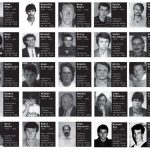FINAL NUMBER OF SIGNATORIES OF THE INITIATIVE AGAINST THE INTRODUCTION OF RELIGIOUS EDUCATION IN THE PUBLIC EDUCATION SYSTEM: 114 NGOs and 9 CIVIL ACTIVISTS
16/04/2025STATEMENT REGARDING THE FREQUENT INCIDENTS OF HATE SPEECH AGAINST WOMEN
23/04/202526 YEARS SINCE THE CRIME IN KALUĐERSKI LAZ: WITHOUT JUSTICE AND A MEMORIAL
Human Rights Action (HRA) and the Montenegrin Committee of Lawyers for the Protection of Human Rights (CKP) remind that tomorrow marks 26 years since members of the Army of the Federal Republic of Yugoslavia killed 21 civilians and wounded another seven in the area of Kaluđerski Laz, near Rožaje. The victims were of Albanian ethnicity, who, fleeing the conflict in Kosovo during the NATO intervention in 1999, sought refuge in Montenegro.
No one has been held accountable for this crime to date. The competent authorities have not classified it as a war crime, the victims and their families have not been compensated, and there is no memorial at the site of the tragedy.
HRA and CKP call on the Ministry of Culture and Media to allow the erection of a memorial for the victims in Kaluđerski Laz as soon as possible and to enable a dignified remembrance of the civilians who suffered there.
Rožaje and the surrounding areas provided refuge to a large number of refugees from Kosovo in 1998–1999. Šemso Dedeić, then a police officer and head of the Security Department in Rožaje, testified at the trial of those accused of the crime in Kaluđerski Laz:
Civilians who were moving towards Rožaje from the direction of Kosovo were unarmed. Civilians from Kosovo were accepted and accommodated in Rožaje as refugees, with the number of them daily reaching about ten thousand, and sometimes more, during the war.
In memory of the victims of the crime in Kaluđerski Laz, friends, citizens, and activists will gather on Friday, April 18th, at 10:00 AM at the site of the tragedy to mark the anniversary of the crime. On the same day, at 12:00 PM, the families of the victims, friends, and activists will lay flowers at the memorial tomb in Novo Selo, near Peć.
HRA and CKP welcome the reopening of the criminal case regarding the war crime in Kaluđerski Laz. We appeal for urgent action in this case while witnesses and surviving family members of the victims are still alive. Any further delay in justice only deepens the injustice toward the victims and their families, and undermines the rule of law.
We remind that it is unknown why soldiers opened fire on refugees that day. To date, the killings of eleven civilians have been prosecuted, six of whom were killed in Kaluđerski Laz, with others killed at different locations. Due to the poorly conducted investigation in this case, according to the ruling of the Higher Court in Bijelo Polje, it was not possible to determine who shot at the civilians, so all accused members of the Army of the FRY were acquitted in 2014 due to lack of evidence. In this case, the Higher Court in Bijelo Polje did not even address whether a war crime had been committed in the Kaluđerski Laz area. This reduced the possibility of determining the responsibility of those who were in command of the direct perpetrators based on command responsibility.
An analysis of the acquittal ruling was published in the HRA report War Crimes Trials in Montenegro 2009–2015.
At the trial, former police officer Dema Ramović gave the following statement:
I noticed a group of 30-40 civilians with their hands on the back of their heads, lying down, next to whom stood two soldiers with their barrels pointed towards these civilians. Sporadic gunfire from automatic firearms with short bursts, with longer intervals, as they say – sporadic gunfire, could already be heard from the place where we met the first column of civilians, and it was coming from the direction of the settlement of Kaluđerski Laz. When we reached this second group of civilians, the shooting intensified and it was longer, with longer bursts… It was intense gunfire.
“I have never had the opportunity to notice members of the so-called ‘KLA’ in the area under the jurisdiction of the Security Department, nor did we have official information about the movement and presence of such individuals in the territory of the municipality of Rožaje during that period.”
The continuation of this story can be found in HRA’s book Against Forgetting. We have published statements from locals, one of the survivors of the refugee column, and two members of the Montenegrin police.







 English
English